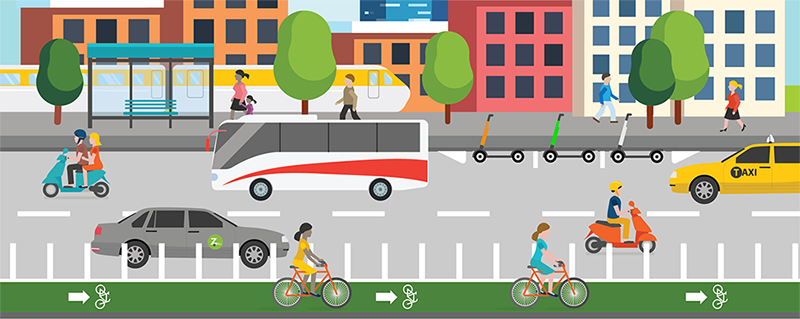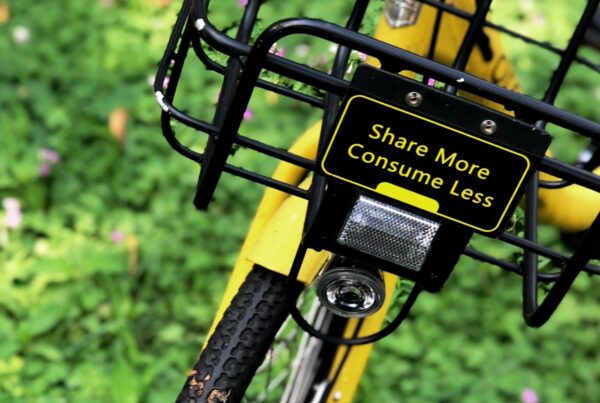Welcome to the Shared-Use Mobility Center’s weekly guide to the most impactful news, thought-provoking articles and innovative technologies that are shaping our transportation future. We believe in sharing information, just like sharing cars, bikes, and scooters, so if there’s anything additional you’d like to see, just drop us a line.
SUMC News and Announcements
SUMC, FTA create a national program to foster mobility innovation in transit communities
The Shared-Use Mobility Center is partnering with the Federal Transit Administration (FTA) to establish a new, far-reaching program to foster mobility innovation. The Accelerating Innovative Mobility National Network (AIM-NNet) will work closely with public transportation agencies, communities, and regions to adopt leading-edge mobility solutions by providing technical assistance, peer learning, and best practices to pilots and projects.
SUMC’s AIM-NNET innovation network will have an expansive focus, including transit and share mobility integration, first- and last-mile solutions, Maas applications, automation, electrification, and more. It will start with 50 different agencies but looks to expand its work well beyond that. By nurturing ideas and providing the expertise to build, test, and scale pilots and projects, SUMC’s AIM-NNET innovation network will advance multimodal transportation systems for all. Stay tuned for more exciting news in the coming months.
First Micromobility Policy Atlas Launched on the Learning Center
The Micromobility Policy Atlas is a robust database of local bike- and scooter-sharing regulations from 25 countries. Cities, agencies, and communities can easily access and learn from nearly a dozen areas of regulation with English-language information on guidelines, permits, and laws from local and state/provincial levels dating from 2017.
In light of the unprecedented challenges the world faces today, the governments are evaluating their relationship with micromobility, infrastructure, and land use. The Atlas empowers decision-makers to manage bike- and scooter-sharing services that maximize public goals.
Learn more about the Atlas
Try out the Atlas now
 Reminder:
Reminder:
Mobility Hubs to Connect Communities Webinar and Workshop
October 27, 2020
Noon – 1:30pm EDT | 11:00am – 12:30pm CDT | 9:00 am – 10:30am PDT
Mobility Justice
The LA Times examines 16 cases where bike stops from law enforcement ended up in mostly fatal shootings of the rider in LA County, with a majority of the stops happening in largely Black and Latino communities. Yet further proof of the “disparate and discriminatory enforcement” of vehicle violations in the US.
Portland’s proposed Get Moving 2020 measure would tax businesses with 25+ employees to aid in expanding pedestrian/biking infrastructure and electrifying transit to benefit historically disenfranchised neighborhoods of color. Opposition to the measure is being led by Nike, who ironically just released an ad with the phrase “don’t turn your back on racism”.
The promise of the “Great Migration” was a racist reality for Black Chicagoans and tensions came to a head in the Race Riot of 1919. A self-guided bike tour created last year on the 100th anniversary of the tragedy aims to keep memory alive.
WATCH: Public health researcher Nahomi Amberber, in a Webinar series by Canada’s Learning in Colour, talks about how a lack of equitable access to affordable transportation options and active transportation resources can create a cascade of public health issues that are only exacerbated by the ongoing pandemic.
Ridehailing/Carsharing/Carpooling
Uber and South Korea’s SK Telecom have formed a partnership for a new joint venture subsidiary called T Map Mobility that will leverage $100 million to create a “subscription-based mobility-as-a-service offering” that includes ridehailing, rental cars, and parking integration.
P2P carsharing is seeing rapid growth from Getaround (with global revenue more than doubling since the start of the pandemic) and now the company has raised $140 million in series funding led by PeopleFund.
Read about Ugandan ridehailing startup Diva Taxi that has helped women who have lost their jobs due to the economic downturn from COVID by training and hiring only female drivers in this socially-conservative country.
To build on its Uber Eats brand and on-demand services, the ridehailing company will start delivering over-the-counter medicine in South Africa to compete in the country’s pharmacy-dominated, medicines delivery market.
Bikesharing and Micromobility
According to Streetsblog Chicago, the Second City could learn a thing or two from San Jose’s Better Bike Plan 2025 that aims for 15% of all trips to be made by a bike by 2040 and prioritizes Vision Zero and bike safety equity for disadvantaged areas.
After studying around 500 scooter and bike riders, the Insurance Institute for Highway Safety found that “nearly 3 out of 5 e-scooter riders were injured riding on the sidewalk”, noting a major problem with cities having a lack of dedicated lane infrastructure for bikes and e-scooters.
Mexican Bike advocacy group Bicitekas will be retrofitting and de-electrifying 1,600 bikes from Uber’s JUMP brand, after the mobility company reversed its controversial scrapping practices, giving boroughs outside of Mexico City’s bikeshare network a sustainable cycling option.
Wichita will see its bikeshare system revived as new partner Tandem Mobility picks up the reins from previous owners Zagster, with the new outfit gearing up for a December 1 start date.
Transit
Check out the MTA’s new live digital map for New York’s subway system that uses the agency’s data to show real-time updates with individual train movement, line arrivals for stations, and markers for wheelchair-accessible platforms.
Stranding protestors by shutting down public transportation in cities like Chicago only hurts Black and Brown communities that disproportionately rely on it, and leaves essential workers bearing the brunt of limited mobility options. SUMC, along with 12 other local transportation and equity advocacy organizations, condemn this misuse of a public utility that ends up punishing the most marginalized communities.
The state of public transportation in the US is a dire one, with many agencies facing the bottom of the barrel on dedicated transit funding to continue operating so that jobs and local economies stay afloat. The very outcome of the upcoming Presidential Election will very much set the stage for the future viability of many cities’ transit networks and livelihood.
Transportation researcher Yonah Freemark, aka the Transport Politic, drills into how federal, state, and local governments spend on surface-level transportation infrastructure and how building sustainable, equitable mobility infrastructure requires a federal stimulus and action from lower levels of government.
Technology
In partnership with ElectReon and Dan Bus Company, the City of Tel Aviv has announced a new pilot program that will charge electric public buses using under-road EV charging infrastructure on a 2-kilometer stretch between Tel Aviv University Railway Station and Klatzkin Terminal in Ramat Aviv.
Ford believes it’s ready for commercial self-driving vehicle prime time in a new announcement detailing its fourth-generation autonomous test vehicle that uses the automaker’s Escape SUV outfitted with a high-resolution LiDAR sensor. Later this month, the company plans to start field testing the new model in Austin, Detroit, Miami, Palo Alto, Pittsburgh and Washington, DC.
Matthew Lipk, the head of policy at autonomous delivery startup Nuro, discusses the benefits of automated goods delivery to help people save time, especially in suburban and rural areas. Tune in on the Talking Headways podcast.
The Lausanne campus for Switzerland’s EPFL university will conduct a two-month self-driving shuttle pilot that will help deliver meals and local goods for the campus in collaboration with Chinese firm Neolix and the Swiss Post.
Sustainability
Bloomberg lists nine reasons why we need to decriminalizing or outright remove the often victim-blaming jaywalking laws that lead to more dangerous city streets for pedestrians everywhere.
What happens when you leave cars out of the city street equation? Scottish metro Edinburgh did just that for its two busiest streets and now have safer, cleaner pedestrian-only zones—and more cities around the world need to jump on this trend.
#BuildBackBetter has been a rallying cry for cities to stay resilient, resourceful, and future-focused as the pandemic rages on, and cities have responded by retrofitting commercial space for multi-use operations and creating tactical urbanist solutions for street infrastructure to revitalize their urban cores.
Walkability is king in ITDP’s new Pedestrians First walkability-measuring tool for city planners, sustainable mobility advocates, and ped-friendly advocates to examine transit-access, people-centric infrastructure, and pathway design for neighborhoods worldwide.
Requests for Proposals, Inquiries, and Information
RFP: Three Health Care Shuttles for Salem County Senior Residents and Limited Disabled Residents, and General Population in a Rural Area
Salem County
Salem, New Jersey
Deadline: November 5, 2020
NEW RFP: $200 Million For Renewable Energy Supplier for All City-Owned Buildings
City of Chicago
Chicago, IL
Deadline: November 6, 2020
RFI: RideShare Software
Des Moines Area Regional Transit Authority
Des Moines, Iowa
Deadline: November 9, 2020
RFQ: Buffalo Niagara’s Region Central: Utilizing the Scajaquada Corridor to Create Vibrant and Healthy Communities
Greater Buffalo Niagara Regional Transportation Council
Buffalo, NY
Deadline: November 10, 2020
Did someone forward this to you? Sign up for our newsletter here.





